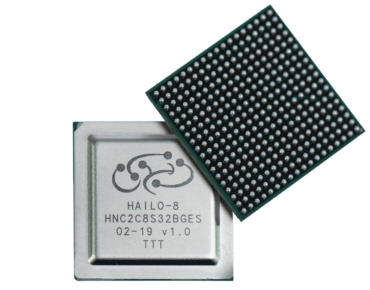Deep Learning Competitors Stalk Nvidia

Source: Hailo.ai
There is no shortage of processing architectures emerging to accelerate deep learning workloads, with two more options emerging this week to challenge GPU leader Nvidia.
First, Intel researchers claimed a new deep learning record for image classification on the ResNet-50 convolutional neural network. Separately, Israeli AI chip startup Hailo.ai released a new deep learning processor on Tuesday (May 14) designed to challenge Nvidia’s Xavier AGX platform for edge applications.
Intel (NASDAQ: INTC) claimed a deep learning performance record of 7,878 image per second on ResNet-50 running the latest generation of its Xeon Scalable processors, topping the performance of Nvidia’s Tesla V100 Tensor Core GPUs, which Intel said achieved 7,844 images per second.
Nvidia’s (NASDAQ: NVDA) deep learning performance results on ResNet-50 and other benchmarks are available here. For its part, the GPU specialist announced a huge performance boost this week by its DGX-2 system running simulations on a financial technology benchmark test.
With the proviso that the benchmarking system can be gamed, Intel nevertheless claimed it achieved record ResNet-50 performance using its second-generation Xeon Scalable processor, formerly codenamed Cascade Lake. The upgraded version dubbed the Xeon Platinum 9282 processor is described as a “high core-count, multichip-packaged server multiprocessor” that used an Intel-optimized Caffe deep learning framework.
Intel announced its “deep learning boost” technology for its Xeon Scalable processor family in April. The upgrade was intended to deliver higher throughput for 8-bit inference. The optimized version of Caffe for 8-bit inference includes weight sharing, convolutional algorithm tuning and memory enhancements, Intel said.
The chipmaker touted the ResNet-50 results as evidence CPUs are more flexible than “brute strength” GPUs for a variety of cloud and datacenter workloads such as deep learning and inference. “Since CPUs are designed for a broad set of applications, customers can run any [deep learning] workload important to their business at any given time,” Intel asserted in a blog post announcing the ResNet-50 results.
Meanwhile, AI processor startups continue to nip at Nvidia heels. Tel Aviv-based Hailo released a deep learning processor on Tuesday (May 14). It is sampling the AI chip with selected partners, particularly in the automotive sector. The new processor is designed to enable edge devices to run deep learning applications that previously ran in the cloud.
Hailo also compared the performance of its deep learning processor with Nvidia’s Xavier AGX platform in ResNet-50 benchmark tests, claiming its Hailo-8 chip consumes nearly 20 times less power while performing the same tasks. Along with power efficiency, the new embedded processor delivers 26 TOPS performance for edge processing.
The AI chip startup founded in 2017 by members of the Israeli Defense Forces’ intelligence unit is targeting its new deep learning processor at autonomous driving systems.
“We’ve witnessed an ever-growing list of applications unlocked by deep learning, which were made possible thanks to server-class GPUs,” said Hailo CEO Orr Danon. With the rise of AI technologies, “there is a crucial need for an analogous architecture that replaces processors of the past, enabling deep learning to run devices at the edge,” Danon added.
Related
George Leopold has written about science and technology for more than 30 years, focusing on electronics and aerospace technology. He previously served as executive editor of Electronic Engineering Times. Leopold is the author of "Calculated Risk: The Supersonic Life and Times of Gus Grissom" (Purdue University Press, 2016).










